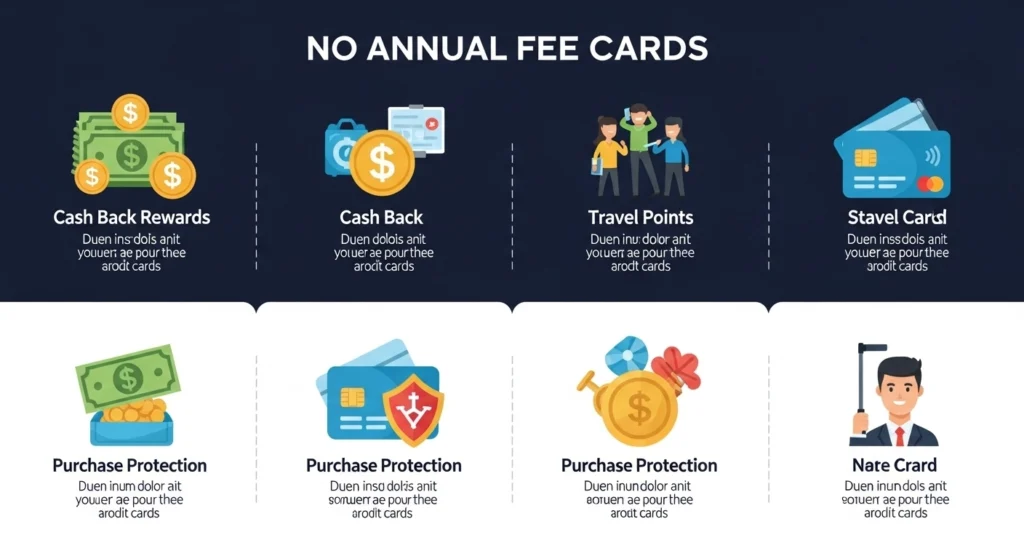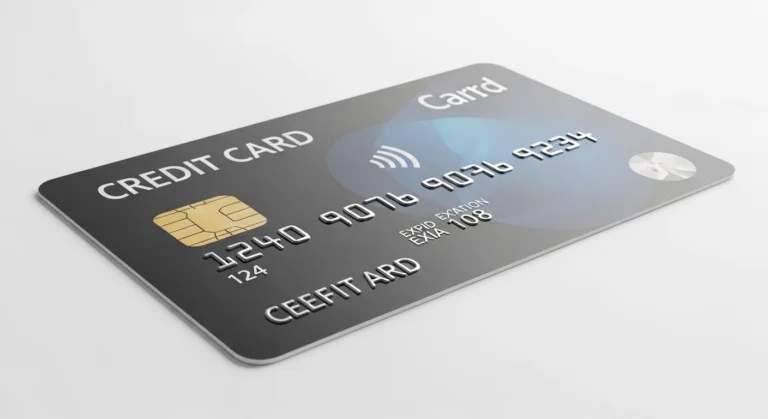Introduction
Starting your credit journey can feel like navigating a maze, but one of the smartest first steps you can take is choosing a credit card with no annual fee. These cards are a fantastic way to build a strong credit history without the burden of recurring yearly charges. They’re ideal for beginners, students, or anyone looking for a simple, cost-effective way to manage their finances responsibly.
But with so many options out there, how do you pick the right one? We’ve sifted through the best of 2025 to bring you our top 10 no annual fee credit cards, perfect for those just dipping their toes into the world of credit.
Importance of choosing the right beginner credit card
Choosing the right credit card from the start sets the foundation for your financial future. A good beginner card helps you establish a positive credit history, which is crucial for everything from renting an apartment to securing a loan for a car or home. Making the wrong choice, on the other hand, can lead to debt and damage your credit score before you’ve even truly begun.
Why no annual fee cards are ideal for first-timers
For a beginner, a no annual fee credit card is practically a no-brainer. These cards remove one of the most common barriers to entry – an upfront or recurring cost – allowing you to focus purely on responsible credit management.
What to Look for in a Beginner Credit Card
Beyond simply having “no annual fee,” there are several key features that make a credit card ideal for beginners:
No Annual Fee
This is non-negotiable for a beginner. An annual fee adds an unnecessary cost when your primary goal is to build credit responsibly without incurring extra expenses.
Low Interest Rates
While the goal is always to pay your statement balance in full each month to avoid interest, a low Annual Percentage Rate (APR) provides a safety net. If an unexpected expense prevents you from paying in full, a lower interest rate will minimize the cost of carrying a balance. Look for cards that offer a low ongoing APR after any introductory periods.
Credit-Building Tools
Some cards offer specific features designed to help you build credit. This can include reporting to all three major credit bureaus (Experian, Equifax, and TransUnion), offering access to your FICO score, or providing tools to track your progress and spending habits. Secured cards, which require a deposit, are also excellent credit-building tools for those with no credit history.
Simple Rewards Programs
While not strictly necessary for a beginner, a simple rewards program can add value. Look for straightforward cash back programs (like flat-rate percentages on all purchases) rather than complex points systems or rotating categories that might be harder to maximize. The goal is to earn a little extra without overcomplicating your financial management.
Benefits of No Annual Fee Credit Cards

Choosing a no annual fee credit card offers distinct advantages, particularly for those new to credit:
Cost-effective for new users
Without an annual fee, you save money right from the start. This allows you to allocate your funds towards paying down your balance and focusing on responsible spending habits, rather than offsetting a yearly charge. It makes learning about credit much more affordable.
Easier to maintain credit utilization
Credit utilization, which is the amount of credit you’re using compared to your total available credit, is a major factor in your credit score. With no annual fee, you can keep your credit card account open indefinitely, even if you don’t use it frequently. This contributes to a longer credit history and a higher total available credit, making it easier to keep your utilization low on other cards as your credit profile grows.
Ideal for building a solid credit history
The primary goal for a beginner is to establish a positive credit history. No annual fee cards are perfect for this because they allow you to demonstrate consistent, responsible behavior (paying on time, keeping balances low) without adding an unnecessary financial burden. You can maintain these cards for many years, showing lenders a long track record of good credit management, which is highly favorable.
Our Top 10 No Annual Fee Credit Cards for Beginners (2025)
Here are our picks for the best no annual fee credit cards for beginners, offering a mix of rewards, features, and accessibility:
- Chase Freedom Unlimited®: A standout for its flexible cash back. You’ll earn at least 1.5% cash back on all purchases, with boosted rates on dining, drugstores, and travel booked through Chase. Plus, a solid intro APR offer.
- Citi Double Cash® Card: This card is all about simplicity and high cash back. You earn 1% cash back when you make a purchase and another 1% when you pay for it, totaling 2% cash back on everything. It’s tough to beat that flat rate!
- Discover it® Cash Back: Perfect for those who enjoy maximizing rewards through rotating bonus categories (e.g., gas stations, restaurants, grocery stores). Discover also matches all the cash back you earn in your first year – a huge perk.
- Chase Freedom Flex℠: Similar to the Freedom Unlimited, but with rotating 5% cash back categories (up to a quarterly maximum upon activation) that change every three months. This can be incredibly rewarding if your spending aligns with the categories.
- Wells Fargo Active Cash® Card: A strong contender for flat-rate cash back, offering an unlimited 2% cash back on every purchase. It’s straightforward and rewarding for everyday spending.
- Capital One Quicksilver Cash Rewards Credit Card: Another excellent choice for simple, unlimited cash back, earning 1.5% on all purchases. It’s often recommended for beginners due to its ease of use and potentially lower credit requirements.
- Discover it® Secured Credit Card: If you’re starting with no credit or rebuilding, a secured card like this one is a great option. You provide a refundable security deposit, and your credit line is typically equal to that deposit. It reports to all major credit bureaus, helping you build credit, and it even offers cash back rewards!
- Capital One Platinum Credit Card: While it doesn’t offer rewards, this card is specifically designed for building credit with fair or limited credit. It has no annual fee and you’ll be automatically considered for a higher credit line in as little as 6 months.
- Chase Freedom Rise® Credit Card: A newer option specifically tailored for those new to credit. It offers 1.5% cash back on all purchases and can be easier to get approved for, especially if you have an existing Chase bank account.
- Capital One VentureOne Rewards Credit Card: If you’re interested in travel rewards, this card offers 1.25 miles per dollar on every purchase. While it’s travel-focused, its no annual fee makes it accessible for beginners who might eventually want to delve into travel hacking.
The Human Touch: Your Credit Journey Begins Now
Remember, getting your first credit card is an exciting step towards financial independence. Choose a card that aligns with your spending habits and financial goals, and commit to responsible use. Pay your bills on time, keep your credit utilization low, and watch your credit score flourish. These no annual fee options are a fantastic foundation for a healthy financial future. Happy spending (and saving)!
FAQ
Q: Do I really need a credit card as a beginner? A: Yes, establishing a good credit history is crucial for many financial aspects of your life, from getting a loan for a car or home to even renting an apartment or getting certain jobs. A credit card is one of the most effective tools for building that history.
Q: Can I get a no annual fee credit card with no credit history? A: Absolutely! Many of the cards listed, especially secured credit cards like the Discover it® Secured Credit Card or cards specifically designed for building credit like the Chase Freedom Rise® Credit Card and Capital One Platinum Credit Card, are excellent options for those with no credit history.
Q: What is a “secured credit card” and how does it work? A: A secured credit card requires you to put down a refundable cash deposit, which typically becomes your credit limit. This deposit acts as collateral for the issuer. As you use the card responsibly (making on-time payments), the issuer reports your activity to the credit bureaus, helping you build your credit score. After a period of responsible use, you may be able to transition to an unsecured card and get your deposit back.
Q: How can I avoid paying interest on my credit card? A: The best way to avoid paying interest is to pay your entire statement balance in full by the due date every month. If you carry a balance, interest will accrue on the outstanding amount.
Q: What is “credit utilization” and why is it important? A: Credit utilization is the percentage of your available credit that you’re currently using. For example, if you have a credit limit of $1,000 and a balance of $300, your utilization is 30%. Keeping your credit utilization low (ideally below 30%) is a major factor in maintaining a good credit score.
Q: Should I close my first no annual fee credit card once I qualify for better cards? A: Generally, no. Keeping older credit accounts open (especially no annual fee ones) helps lengthen your credit history, which positively impacts your credit score. Closing an old account can also decrease your total available credit, potentially increasing your credit utilization ratio.
Q: Are rewards programs on no annual fee cards worth it? A: Yes, many no annual fee cards offer excellent rewards, particularly cash back. While they may not have the same premium perks as cards with high annual fees, earning 1.5% or 2% cash back on everyday spending can add up significantly over time, essentially giving you a discount on your purchases.
Conclusion
Embarking on your credit journey with a no annual fee credit card is a smart and strategic move. These cards offer a risk-averse entry point into the world of credit, allowing you to build a robust financial foundation without the pressure of recurring costs. By focusing on responsible habits – paying your bills on time, keeping balances low, and understanding your card’s terms – you’ll lay the groundwork for a strong credit score that opens doors to future financial opportunities.
The cards highlighted in this article represent some of the best options for beginners in 2025, providing a blend of accessibility, valuable rewards, and crucial credit-building features. Choose the one that best fits your initial spending patterns and financial goals, and commit to using it wisely. Your journey towards financial empowerment starts here, with a simple, yet powerful, no annual fee credit card.

